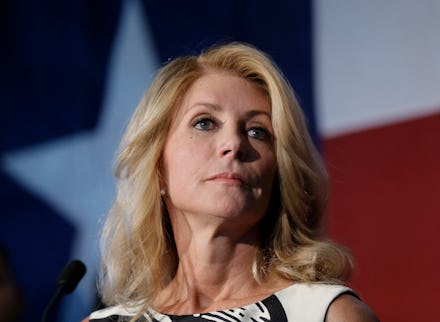The Two Words Americans Have to Stop Using to Talk About Abortion

Let's get one thing straight: There is no such thing as a "good abortion."
Texas gubernatorial candidate Wendy Davis' revelation that she has had two abortions has somehow recycled the tired debate about justifiable abortions. It's one we heard two years ago, during the summer 2012 Todd Akin "legitimate rape" debacle. And here we are again — history really does repeat itself.
In her newly published memoir, Forgetting to be Afraid, Davis writes candidly about her own two abortions, one due to an ectopic pregnancy and another from a pregnancy in which the growing fetus was suffering from a "severe brain abnormality."
While Texans will decide her political fate come November, people across the country have already spent plenty of time discussing Davis' two abortions. Unfortunately, the majority of this coverage has centered around the question of "justifiability." Because abortion rights have been stripped and hindered in states across the country, women have ended up in a corner, forced to highlight only the abortions deemed publicly acceptable, creating a "moral hierarchy" of abortion.
Take, for example, Merritt Tierce's recent op-ed for the New York Times, in which she asserts that the current abortion debate renders abortion an irregularity in women's lives, establishing a palpable culture of judgement for all women who have abortions.
"Abortions like [Davis'] represent the basic currency of the debate," Tierce writes. "These are the stories used to teach us the value of abortion, and the standard against which all other abortion stories must be gauged. By repeating only the gut-wrenching, heartbreaking, terrifying abortion stories, we protect a lie: that abortion isn't normal. We have learned to think of abortion with shame and fear."
Image Credit: AP
This is a bad position for abortion advocates to defend, Tierce continues, because it perpetuates "the damaging idea that a person who wants an abortion must grovel before the consciences of others." In fact, abortion is not always about a desperate medical emergency or tragic case of fetal illness, she notes.
This is how it really is, abortion: You do things you regret or don't understand and then you make other choices because life keeps going forward. Or you do something out of love and then, through biology or accident, it goes inexplicably wrong, and you do what you can to cope.The best thing you can do if you support reproductive rights is to force people to realize that abortion is common, and the most common abortion is a five-to-15-minute procedure elected early in the first trimester by someone who doesn't want to be pregnant or have a child."
Implicit, however, is a moral judgement on another level, in which Davis's abortions are judged from a position of victimhood. It is the direct inverse of the "moral hierarchy." Indeed, the culture of "victimhood" or "victim mentality" has plagued feminism for some time, because it pits women against women in terms of who has suffered more.
This is precisely the point that Irin Carmon makes in an article over at Salon about the "legitimate rape" controversy: "[W]hen progressives cede the moral center to the rape exception, they are implicitly buying into the idea that some reasons to have abortions are more justified than others — and that we should be interrogating these reasons at all."
This not the first time women have attempted to tackle this issue, of course. There are some of women who have worked to normalize abortions of all kinds. Emily Letts went so far as to film her procedure, in an effort to prove that abortions aren't scary. "I just want to share my story, to show women that there is such a thing as a positive abortion story," she notes in the video.
It's imperative that women recognize that both the current political climate and the law have basically turned us against one another. We are denigrating women who have had certain "morally approved" abortions, and outright ignoring those who haven't. The right to choose means the right to choose for all.